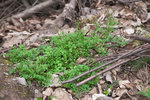

This is the moment: weed now or prepare for a breakdown of law and order in the garden.
If you don’t mind lawlessness and disorder, fine. But weeding early in the spring makes weeding chores in the months ahead lighter by preventing weeds from going to seed and multiplying. That’s important if you want to grow vegetables.
Take carrots, for example. Years ago, when I was younger and less organized, I found myself weeding a large bed of carrot seedlings that was overwhelmed by young shotweed – a pretty little plant, reputed to be quite tasty. The job very nearly required tweezers, and resulted in the demise of about as many carrot seedlings as weeds. Had I pulled the shotweed earlier and more often it would have saved me many hours of this patience-testing finger work.
Still, there are some weeds I like so much I don’t try to pull them all. There’s a native Lamium, blooming now, that charms my socks off. I pull most of them, but leave a few in the flower beds, because I’ve known this weed for many years, and trust it won’t become invasive and crowd out its neighbors.
Weeding is not simple. It involves endless discernment about the practical need to protect the plants we are growing from harmful competition, and the aesthetic question of what balance between order and naturalism we aspire to.
Weeding is also a lifetime of learning about root structures, reproductive strategies, and native versus non-native plants. The first lesson is often the one about how shotweed got its name by having seed cases that explode when you touch them, sending a tiny shower of seeds out to plant themselves in your carrot bed. The second is that if you import soil amendments such as manure, you are likely to import new weeds such as purslane, which, according to the Old Farmers Almanac online, can produce two million seeds from one plant. (It’s also edible.)
Weeding also bears lessons about our irrational human tendency to make enemies even in the plant world. For many years, I despised morning glories for their insidious, invasive roots that seem to sneak around underground and come up everywhere. How ridiculous is that, to hold a grudge against morning glories? I’m over it now, but that’s because I’ve figured out how to thwart them, not because I’ve achieved enlightenment. Also, it helps that my neighbors cooperate in this endeavor because, like most weeds, morning glories have no respect for fences.
Over a lifetime, our garden-related inclinations change, and so does the amount of time we have available to indulge them. Now in semi-retirement, I finally have time to take my own gardening advice. I’ve used nearly every sunny day to pull weeds early, when the soil is soft and wet and the roots come out easily.
In fact I realized yesterday that I may need to restrain my weeding urges, lest my garden becomes too orderly for my tastes. A bit of chaos does seem to be in accord with the ways of the natural world, which needs room for all that is untamed.
Jill Severn writes from her home in Olympia, where she grows vegetables, flowers and a small flock of chickens. She loves conversation among gardeners. Start one by emailing her at jill@theJOLTnews.com
Comments
No comments on this item Please log in to comment by clicking here